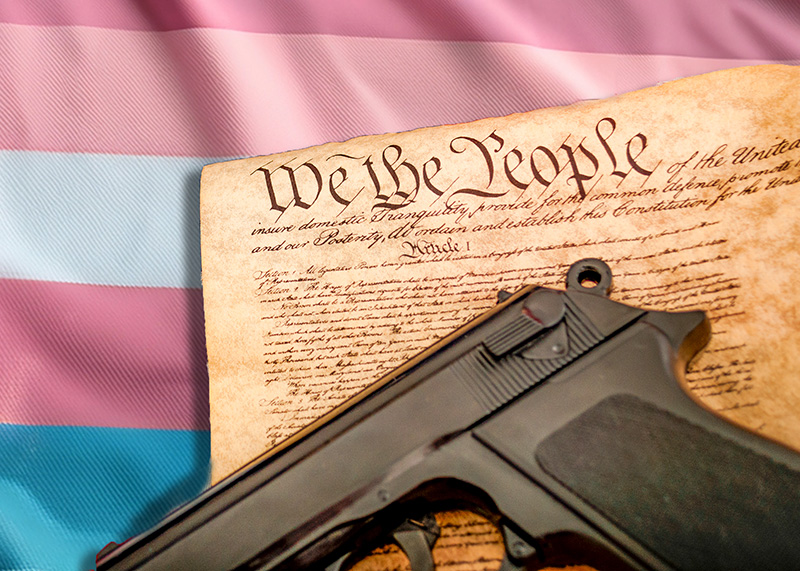Court Backs Trans Plaintiffs in Oklahoma Lawsuit
A federal appeals court restored a lawsuit challenging Oklahoma's prohibition on amending gender markers, calling the policy "irrational."

A federal appeals court says that three transgender individuals should be allowed to sue the state of Oklahoma over a policy prohibiting them from amending the gender marker on their birth certificates to match their gender identities.
On June 18, a three-judge panel of the 10th U.S. Circuit Court of Appeals overturned a lower court ruling dismissing a lawsuit brought by the trio against the state.
The lawsuit targeted an executive order, issued by Republican Gov. Kevin Stitt in November 2021, that reversed a decades-long policy of allowing transgender people to change the gender marker on their birth certificates.
All three judges on the panel agreed that the lawsuit, filed by Lambda Legal on behalf of the transgender individuals, stated valid legal claims alleging that the birth certificate policy unconstitutionally discriminates against transgender people.
They ruled that the Stitt administration’s justification for the policy was irrational.
Circuit Judge Carolyn McHugh, writing on behalf of the appeals court, found that Oklahoma’s various legal justifications for pushing through the birth certificate policy were flimsy.
“[D]efendants argue Oklahoma has an interest in ensuring that all Oklahoma birth certificates uniformly reflect sex assigned at birth,” McHugh wrote. “But this asserted interest is at odds with the fact that Oklahoma allows amendments to the sex designation on driver’s licenses. With the Policy in place, uniformity among official state documents is lacking because Oklahomans like Plaintiffs have a birth certificate that indicates one sex and a driver’s license that indicates another.
“Defendants also contend sex-designation amendments are different from other permitted amendments because sex is immutable. But Oklahoma allows amendments to other seemingly immutable facts — like birth parents,” she added. “For these reasons, the Policy is not rationally related to Defendants’ asserted interest in the accuracy of vital statistics.”
McHugh rejected other rationale for preventing transgender individuals from changing the gender marker on their birth certificates, such as desire to keep sports teams segregated based on athletes’ assigned sex at birth.
She noted that Oklahoma’s sex-segregation policy for sports is enforced by having parents and students submit affidavits attesting to their assigned sex at birth, rather than relying on information provided on birth certificates.
Therefore, she found the birth certificate policy was not relevant to achieving the state’s purported aim.
McHugh even rejected arguments, submitted by people who filed amicus briefs in support of Oklahoma and the Stitt administration, that the birth certificate prohibition is needed to prevent fraud or preserve state resources, finding that “State Amici,” as those parties are called, failed to demonstrate how the policy furthered those aims.
“Plaintiffs have met their burden of negating every conceivable basis that might support the Policy,” McHugh wrote. “To be sure, rational basis is a low bar, and the challenged state action need not be perfect. But there must be some rational connection between the Policy and a legitimate state interest. There is no rational connection here — the Policy is in search of a purpose.”
The appeals court did dismiss the transgender plaintiffs’ claim that the policy violates their right to substantive due process, finding that they had failed to point to a specific state action that violated those rights, such as coercing or intimidating the plaintiffs to produce their original birth certificates.
But a majority of the court found that any government discrimination against transgender people triggers heightened judicial scrutiny, citing the rationale undergirding the Supreme Court’s 2020 ruling in Bostock v. Clayton County, in which the high court found that the Civil Rights Act protects LGBTQ people from workplace discrimination.
“Applied here, Bostock’s reasoning leads to the conclusion that the Policy intentionally discriminates against Plaintiffs based in part on sex,” McHugh wrote on behalf of herself and Judge Richard Federico. “Take [plaintiff] Ms. [Rowan] Fowler, for example. If her sex were different (i.e., if she had been assigned female at birth), then the Policy would not deny her a birth certificate that accurately reflects her identity. So too for Mr. [Allister] Hall and Mr. [Carter] Ray — had they been assigned male at birth, the Policy would not impact them. Thus, the Policy intentionally treats Plaintiffs differently because of their sex assigned at birth.”
Although she noted that the state and its allies have suggested various reasons for why the transgender plaintiff’s claim of discrimination should be rejected, the court, she wrote, “find[s] none persuasive.”
Stitt’s executive order implementing the policy appears to have been motivated, in part, by his own opposition to the concept that a person’s gender can differ from their assigned sex at birth, and in part, a desire to curry favor with social conservatives.
The governor and his fellow Republicans in the legislature were outraged after Oklahoma’s Department of Health complied with a judge’s order and issued an amended birth certificate with a nonbinary gender marker.
“I believe that people are created by God to be male or female. Period,” Stitt said at the time, promising to take “whatever action necessary to protect Oklahoma values and our way of life.”
The birth certificate controversy was widely covered, especially by conservative-leaning media outlets, prompting Lance Frye, the former Oklahoma Commissioner of Health, to resign from his position. Subsequently, Frye’s successor instituted an informal policy refusing to amend the original gender marker on any birth certificates. That policy became formal once the executive order was issued the following month.
In March 2022, Lambda Legal filed the lawsuit on behalf of Rowan Fowler, a transgender woman, ad Allister Hall and Carter Ray, two transgender men, alleging that the policy was not only discriminatory, but created problems for all three plaintiffs when they had to submit birth certificates with a gender marker that does not match their gender identity — and in some cases, the gender marker on their other identity documents.
A federal judge dismissed the lawsuit in June 2023, prompting the plaintiffs to appeal that decision to the 10th Circuit. Now, moving forward, the 10th Circuit has ordered the lower court to reconsider the merits of the transgender plaintiffs’ lawsuit and whether it should proceed.
Lawyers for the plaintiffs celebrated the 10th Circuit’s decision and are looking forward to arguing the policy’s unconstitutionality in court.
“This ruling stands as a monumental win for the transgender community in Oklahoma and nationwide, sending a clear message to lawmakers everywhere that unconstitutional discrimination against transgender people will not be tolerated by the courts,” Peter Renn, senior counsel for Lambda Legal, said in a statement.
“This ruling comes at a critical time amidst a surge in anti-transgender policies of all stripes across the country,” Renn added. “That includes attempts, like the one here, to roll back the basic ability of transgender people to correct their identity documents to match who they are, which can expose them to harassment, abuse, and physical danger.”
Support Metro Weekly’s Journalism
These are challenging times for news organizations. And yet it’s crucial we stay active and provide vital resources and information to both our local readers and the world. So won’t you please take a moment and consider supporting Metro Weekly with a membership? For as little as $5 a month, you can help ensure Metro Weekly magazine and MetroWeekly.com remain free, viable resources as we provide the best, most diverse, culturally-resonant LGBTQ coverage in both the D.C. region and around the world. Memberships come with exclusive perks and discounts, your own personal digital delivery of each week’s magazine (and an archive), access to our Member's Lounge when it launches this fall, and exclusive members-only items like Metro Weekly Membership Mugs and Tote Bags! Check out all our membership levels here and please join us today!



























You must be logged in to post a comment.